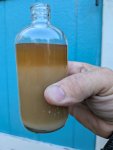Hello
After determining there was still water in the hydraulic oil last winter, I did a second flush and refilled. I just re-drained and, this time, I collected the first bit of oil that came out to assess.
The attached picture was taken 18 hours after collection. It was milky all the way through when I collected it and you can see the slight separation there.
My hope was that any water would separate out completely but I'm wondering whether complete separation can be expected
Does anybody have any tips on determining whether I've got another flush to go on this? That'll affect whether I fill it with premium Kubota fluid or another round of the cheap travelers stuff.
Thx in advance
After determining there was still water in the hydraulic oil last winter, I did a second flush and refilled. I just re-drained and, this time, I collected the first bit of oil that came out to assess.
The attached picture was taken 18 hours after collection. It was milky all the way through when I collected it and you can see the slight separation there.
My hope was that any water would separate out completely but I'm wondering whether complete separation can be expected
Does anybody have any tips on determining whether I've got another flush to go on this? That'll affect whether I fill it with premium Kubota fluid or another round of the cheap travelers stuff.
Thx in advance
Attachments
-
237.3 KB Views: 14




